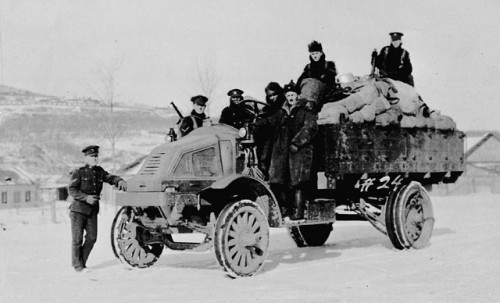Aftermath of the Mutiny

Despite the mutiny that occurred along with the departure of the SS Teesta, the Siberian Expedition still went ahead. Only a few days after the departure of the SS Teesta, the SS Protiselaus left Rithet’s Wharf in Victoria with the rest of the troops who had been training at Willows Camp[1]. The voyages of both the SS Teesta and the SS Protiselaus were very rough, as the ships were overcrowded and not meant to carry as many people in the rough waters they encountered. On the Protiselaus’ trip, two people died and a propeller was lost when the ship became stuck in the ice of the northern Pacific.[2]
When they eventually arrived in Vladivostok, the Canadian soldiers tended to find that there was little to do[3]. While some soldiers did travel north to Omsk, they too found that there was little for them to do. They guarded the city against a Bolshevik attack that never came, and grew to know the local population, which was growing rapidly as many refugees poured in from the surrounding countryside[4]. They were never authorized to attack Bolshevik forces, instead waiting for them to make the first move. In the meantime, the soldiers amused themselves in whatever way possible, while also witnessing the extreme suffering of those fleeing the destruction of the revolution. One small mobilization in the small village of Shkotova turned out to be nothing but a wild goose chase, as by the time they arrived to fight the Bolshevik forces, those forces had disappeared back into the countryside. [5]
War diaries of the “B” Squadron North West Mounted Police in Vladivostok can be found here.
Eventually, all Canadian soldiers were evacuated from May to June 1919 and arrived home in Victoria to find that Canada had moved on[6]. Their expedition and the resistance to it had been forgotten, and life was steadily returning to normal.



















